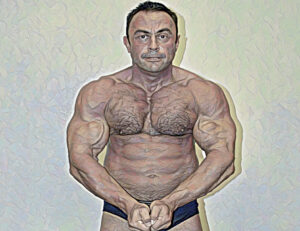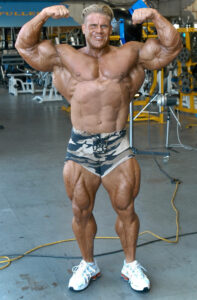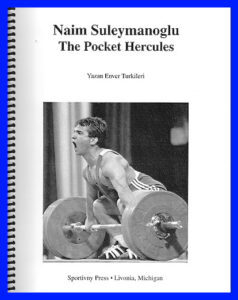Strength Sensei 101: Sets

More insights into the training methods of Charles R. Poliquin
The first article in this series discussed how Charles R. Poliquin determined that the foundation of any workout program is the rep. All loading parameters are affected by the number of reps performed, including the next one on our checklist, sets.
The Strength Sensei’s research at the university led him to discover an Eastern Bloc article published in 1975 called “Speed and Strength.” [Kuznetsov, V. (1975). Speed and Strength. Yessis Rev, 10(3): 78-83.] In 1986, the Strength Sensei expanded on this work by publishing this table showing the relationship between several loading parameters.
Reps Sets % of Maximum Rest Interval Speed of Execution
2-3 6-12 90-95% 5-8 min Moderate to Explosive
4-7 5-10 80-88% 3-6 min Moderate to Explosive
4-6 4-8 70-78% 3-6 min Extremely Slow
8-10 4-8 75-79% 2-5 min Moderate to Fast
11+ 3-6 <72.5 0.5-3 min Moderate to Fast
Consider that percentages are provided in this table, but only as a general reference. Because so many variables can affect these percentages, such as muscle fiber type, the Strength Sensei adopted a more practical and accurate approach which is to let the repetitions determine how much weight would be used (i.e., let the reps determine the load).
In 1989, the Strength Sensei expanded on these ideas of set selection in a paper he wrote for an Australian coaching magazine. Here are a few of his conclusions:
- For beginners, one or two sets are enough to elicit a training stimulus for six to 12 training sessions.
- After initial strength fitness is achieved, 3 to 10 sets are required to achieve optimal overloading.
 As a bodybuilder advances in muscular development, they need more sets to continue making progress. One advocate of high-volume weight training was 4x Mr. Olympia Jay Cutler. (Miloš Šarčev photo)
As a bodybuilder advances in muscular development, they need more sets to continue making progress. One advocate of high-volume weight training was 4x Mr. Olympia Jay Cutler. (Miloš Šarčev photo)
- Single-set protocols are inferior to multi-set protocols. (The Strength Sensei would later point out that those who use these low-volume training programs may experience short-term success not because the program is superior, but because they were overtrained. This resulted in the phrase he was fond of saying, “Fatigue masks fitness!”
- There is an inverse relationship between reps and sets, such that the fewer reps you perform, the more sets you need to achieve an optimal training effect.
- There is an inverse relationship between the size of the muscle mass being trained and the sets performed. Small muscle groups (such as the biceps) recover faster than large muscle groups (such as the quadriceps) and thus can handle more sets.
- The nature of a muscle group affects the number of sets performed. Muscles that are not subject to intense loading in daily life, such as the neck flexors and extensors, do not require as many sets to achieve an optimal training effect.
- The number of sets is individualized, such that some individuals need to perform more sets to achieve an optional training effect.
- There is a ceiling to how many sets should be performed in a single training session. As a general guideline, 30-36 sets per workout are the upper limit.
- The length of a training session may be used to determine the length of a training session, and thus the number of sets performed. Generally, 45 minutes to one hour is best. To support his opinion, the Strength Sensei cited the training method of Bulgarian weightlifters who believed that after one hour of training, testosterone levels decrease. Noted Bulgarian weightlifting coach Angel Spassov:
“It is known that the level of testosterone increases after the beginning of physical activity up to 20 minutes and, having reached its maximal value, it preserves that level up to 42 to 45 minutes. Then it begins to drop, and this process is particularly intense by the end of the first hour of work. It has already become clear that a single strength training session should not last more than an hour.” [Spassov, A., Constructing Training Programs, Part II. National Strength and Conditioning Journal, Vol. 10, No. 5, 1988, pp 65-70.]
 Bulgarian weightlifters popularized the advantages of limiting strength workouts to less than one hour. Their most famous athlete was 3x Olympic champion Naim Süleymanoğlu. A book about this amazing athlete, considered pound-for-pound the strongest weightlifter ever, is available through dynamicfitnessequipment.com.
Bulgarian weightlifters popularized the advantages of limiting strength workouts to less than one hour. Their most famous athlete was 3x Olympic champion Naim Süleymanoğlu. A book about this amazing athlete, considered pound-for-pound the strongest weightlifter ever, is available through dynamicfitnessequipment.com.
- It’s the volume of training, not the intensity, that contributes to overtraining. This means an athlete can still make strength gains in-season by reducing the volume of training but keeping the intensity high. This is in contrast to going on a “maintenance” phase of low volume and low intensity that often results in a gradual decrease in strength.
In addition to weight training, the Strength Sensei found with his work with the Canadian Alpine Ski team before the 1992 Olympics that you could significantly reduce the volume of aerobic training by as much as two-thirds and maintain that VO2 capacity for several months.
What he found was that V02 capacity would increase for six to eight weeks of specialized training, then it plateaued for several months. The Strength Sensei found he could reduce the training volume by more than two-thirds during this period without losing aerobic conditioning, using the time to develop in other areas of athletic fitness or other aspects of sports training. He supported this idea with the following research study: Reduced Training Duration Effects on Aerobic Power, Endurance, and Cardiac growth,” by R. C. Hickson et al., Journal of Applied Physiology, 1982, 53:225-229.
Charles R. Poliquin learned early on that determining the optimal number of sets was essential for designing the best strength training programs. Much of the research he used to develop his training theories was published a half-century ago, but the work has stood the test of time! (TSS)
